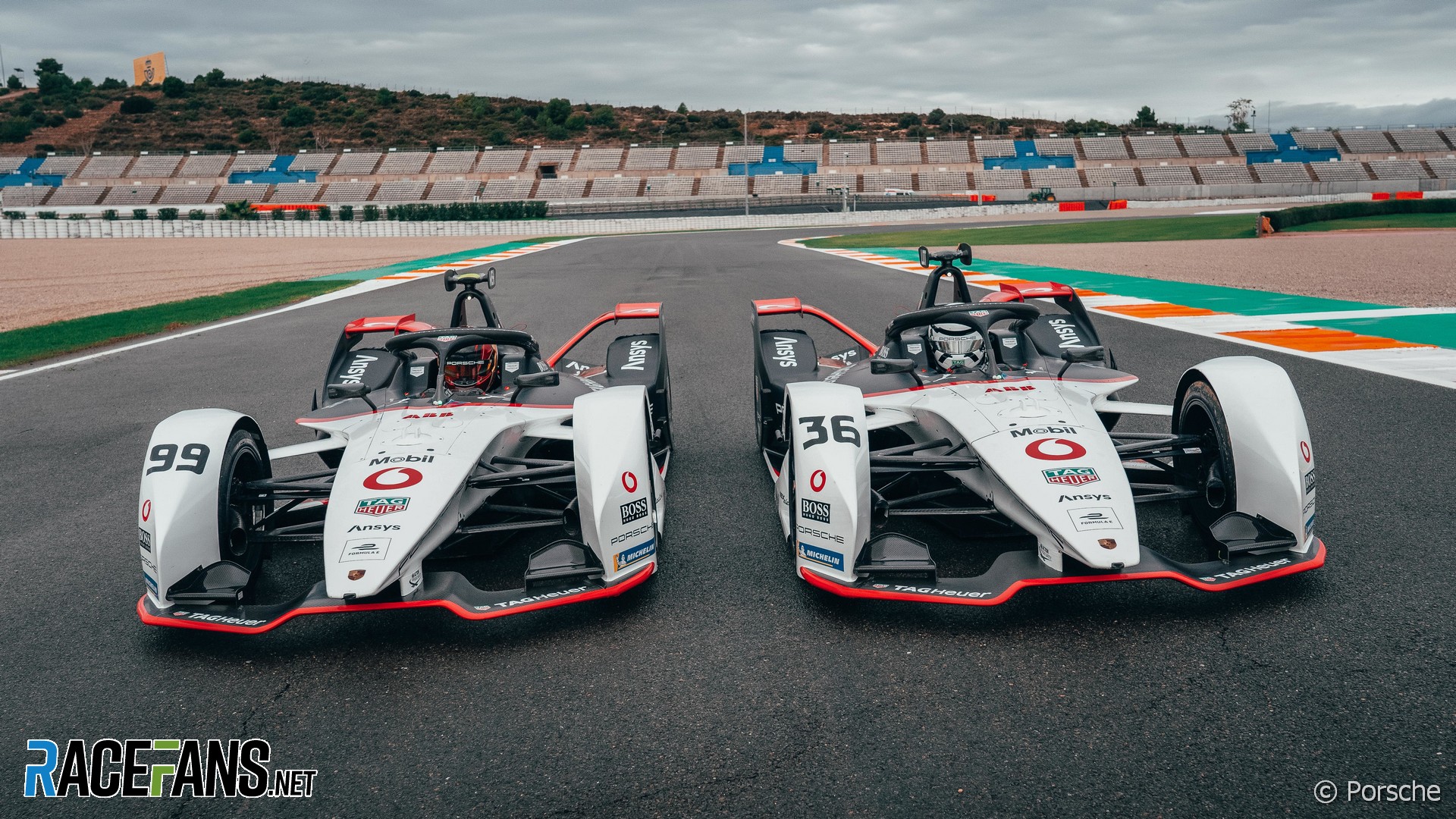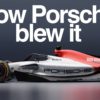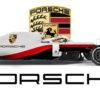
When it comes to the world of Formula 1 racing, the names of legendary teams like Ferrari, McLaren, and Mercedes-Benz immediately come to mind. But what about Porsche? Did the iconic German automaker ever have its own team in the pinnacle of motorsport? The answer may surprise you.
Porsche is renowned for its success in endurance racing, with a record-breaking number of victories at the 24 Hours of Le Mans. However, despite its rich racing heritage, Porsche has never had a full-fledged Formula 1 team. This might come as a surprise considering the company’s engineering prowess and commitment to motorsport.
While Porsche has never had a dedicated F1 team, the marque has had a few notable forays into the world of Formula 1. In the 1960s, Porsche supplied engines to several F1 teams, including the British team, Rob Walker Racing. These Porsche engines, known for their reliability and power, achieved some impressive results, including a win at the 1962 French Grand Prix.
Furthermore, Porsche made a brief return to F1 in the 1980s as an engine supplier. The TAG-Porsche partnership with McLaren resulted in tremendous success, with Niki Lauda and Alain Prost winning three consecutive world championships from 1984 to 1986. This collaboration showcased Porsche’s engineering prowess and solidified the company’s reputation in the world of motorsport.
So, while Porsche may not have had its own dedicated F1 team, the brand’s presence in the sport cannot be overlooked. From supplying engines to achieving championship success as an engine supplier, Porsche has undoubtedly left its mark on the world of Formula 1.
The History of Porsche in Formula 1
Despite being one of the most iconic sports car manufacturers in the world, Porsche’s involvement in Formula 1 has been limited. While the company has had a strong presence in various motorsport disciplines, including endurance racing and rallying, it has never had a full-fledged Formula 1 team of its own.
However, that’s not to say Porsche has never been involved in Formula 1. In the 1960s, the German manufacturer provided engines to a number of teams competing in the championship. One of the most notable collaborations was with the British team Williams, which used Porsche-powered cars in the late 1960s and early 1970s.
During this period, Porsche’s engines were known for their reliability and power. They played a key role in helping Williams achieve success in Formula 1, with drivers like Piers Courage and Derek Bell achieving podium finishes in Porsche-powered cars.
While Porsche’s engines were competitive, the company ultimately decided to focus on other motorsport disciplines and withdrew from Formula 1. The decision was influenced by factors such as the increasing costs of competing in the championship and Porsche’s desire to concentrate on developing road cars.
Despite not having a direct presence in Formula 1, Porsche’s influence can still be felt in the sport. Many Porsche engineers and designers have gone on to work for Formula 1 teams, bringing their expertise and knowledge to help develop winning cars. Additionally, Porsche has maintained a strong presence in other racing series, such as the World Endurance Championship, where it has enjoyed considerable success.
The Early Years
Porsche has a long and storied history in motorsports, but did you know that they once had a Formula 1 team? The story of Porsche’s involvement in Formula 1 goes back to the early years of the sport.
In the 1950s, Formula 1 was still in its infancy, and Porsche was eager to make a name for itself on the racing circuit. In 1957, they entered the Formula 1 World Championship with their first car, the Porsche 718. This car featured a mid-engine design, which was innovative for its time.
The 718 proved to be a competitive car, with driver Hans Herrmann scoring several top finishes throughout the season. However, Porsche’s foray into Formula 1 was short-lived. After just one season, they decided to withdraw from the championship due to financial constraints.
Despite their brief time in Formula 1, Porsche’s early years in the sport laid the foundation for their future success. The lessons learned from their involvement in Formula 1 helped shape the development of their road cars, as well as their continued participation in other motorsports disciplines.
Porsche’s Involvement in Formula 1

Porsche, a renowned German automobile manufacturer, has had a long and storied history in motorsport, but its involvement in Formula 1 has been rather limited. While Porsche is best known for its success in endurance racing and sports car competitions, the brand did have a brief foray into the world of Formula 1 in the 1960s.
In 1961, Porsche decided to enter the Formula 1 championship and developed their own car, the Porsche 718. The car featured a flat-eight engine and made its debut at the 1961 Monaco Grand Prix. However, despite some promising performances, the Porsche 718 struggled to compete with more established teams and failed to achieve significant success in Formula 1.
Due to financial difficulties and the high costs associated with Formula 1, Porsche made the decision to withdraw from the championship after just one season. Instead, the company decided to focus on other racing disciplines where they had enjoyed greater success, such as endurance racing and sports car competitions.
Although Porsche’s involvement in Formula 1 was relatively short-lived, the brand’s presence left an indelible mark on the sport. The Porsche 718, with its distinctive flat-eight engine, remains a symbol of Porsche’s engineering prowess and innovation. Today, Porsche continues to dominate in various motorsport competitions, including the prestigious 24 Hours of Le Mans and the World Endurance Championship.
While Porsche may not currently have a team in Formula 1, the brand’s legacy and influence in motorsport are undeniable. Fans of both Porsche and Formula 1 can appreciate the brand’s commitment to pushing the boundaries of automotive technology and performance, even if its Formula 1 venture was relatively short-lived.
Challenges Faced by Porsche
Porsche has faced several challenges throughout its history, which have tested the company’s resilience and innovation. One of the major challenges faced by Porsche was the decline in sales during the global economic crisis in the late 2000s. The economic downturn led to a decrease in consumer spending and a decline in demand for luxury sports cars, which impacted Porsche’s sales and profitability.
Another challenge faced by Porsche was the rapid shift in consumer preferences towards electric and hybrid vehicles. As the automotive industry embraced sustainability and environmental consciousness, Porsche had to adapt to this changing landscape by developing its own line of electric and hybrid vehicles. This required significant investment in research and development, as well as a shift in the company’s manufacturing processes.
Porsche also faced challenges in terms of competition from other luxury car manufacturers. The company had to constantly innovate and differentiate its products to stay ahead of competitors such as Ferrari, Lamborghini, and Aston Martin. This required continuous investment in design, technology, and performance, as well as a strong marketing strategy to attract and retain customers.
Additionally, Porsche faced challenges in terms of maintaining its reputation for quality and reliability. As a high-end luxury brand, customers have high expectations for the performance and durability of Porsche vehicles. Any quality issues or recalls can have a significant impact on the company’s reputation and customer loyalty. Porsche has had to invest in quality control measures and ensure that its vehicles meet the highest standards of performance and reliability.
Overall, Porsche has faced various challenges throughout its history, ranging from economic downturns to shifts in consumer preferences and intense competition. However, the company has demonstrated its ability to adapt and innovate, ensuring its continued success in the luxury automotive market.
The Golden Era
The Golden Era of Porsche in Formula 1 began in the 1960s and lasted until the early 1970s. During this period, Porsche achieved remarkable success and made a significant impact on the sport.
Porsche first entered Formula 1 in 1962, partnering with the privateer team, Porsche System Engineering. The team used the Porsche 718 as their race car, powered by a flat-eight engine. Despite limited resources and competition from larger teams, Porsche System Engineering managed to secure several podium finishes and even achieved a victory at the 1962 French Grand Prix.
In 1963, Porsche introduced the legendary Porsche 804, which was specifically designed for Formula 1 racing. This car featured a flat-eight engine and innovative technical solutions, such as a fuel injection system. The Porsche 804 performed exceptionally well, with Dan Gurney winning the 1962 French Grand Prix and finishing second overall in the 1963 Drivers’ Championship.
However, despite these early successes, Porsche’s involvement in Formula 1 was short-lived. The company decided to focus on other racing disciplines, such as endurance racing and sports car racing. Porsche’s decision to withdraw from Formula 1 was primarily driven by financial considerations and their desire to allocate resources efficiently.
Although Porsche’s official presence in Formula 1 was relatively brief, their impact on the sport was significant. The innovative engineering solutions introduced by Porsche, such as the use of fuel injection and flat-eight engines, influenced the development of future Formula 1 cars. Porsche’s success in the early 1960s also demonstrated their technical prowess and established them as a force to be reckoned with in the world of motorsport.
Porsche’s Success in Formula 1
Porsche, a renowned German automobile manufacturer, has had a significant and successful presence in the world of Formula 1 racing. Although Porsche itself has never competed as a works team in Formula 1, their engines and technology have played a crucial role in the success of various other teams in the sport.
One of the most iconic partnerships in Formula 1 history was between Porsche and McLaren in the 1980s. The collaboration between these two powerhouses resulted in the creation of the TAG-Porsche engine, which powered McLaren to multiple World Championships. The engine, known for its reliability and power, played a pivotal role in the success of McLaren drivers such as Niki Lauda and Alain Prost.
Porsche also had a successful stint as an engine supplier in the late 1950s and early 1960s. They provided engines to teams like Cooper and Lotus, contributing to their victories in Formula 1 races. The Porsche engines were known for their innovative design and performance, which helped propel these teams to the forefront of the sport.
In addition to their engine contributions, Porsche has also made a mark in Formula 1 through their technological advancements. The company’s expertise in aerodynamics, materials, and engineering has been utilized by various teams to improve the performance of their cars. Porsche’s involvement in Formula 1 has not only benefited the teams they have partnered with but has also pushed the boundaries of innovation in the sport as a whole.
While Porsche has never had its own works team in Formula 1, their success as an engine supplier and technological partner cannot be underestimated. The impact of their engines and expertise has been felt throughout the history of the sport, and their contribution to the success of teams like McLaren and Cooper is a testament to their excellence in Formula 1.
Notable Drivers for Porsche
Porsche has a rich history in motorsport, and over the years, it has been associated with several notable drivers who have achieved great success in various racing series.
One of the most iconic drivers for Porsche is Hans Herrmann. He was a German racing driver who competed for Porsche in the 1950s and 1960s. Herrmann achieved great success with Porsche, including winning the 24 Hours of Le Mans in 1970.
Another notable driver for Porsche is Derek Bell. Bell is a British racing driver who had a long and successful career with the team. He competed for Porsche in both endurance racing and Formula 1, and he achieved multiple victories, including five wins at the 24 Hours of Le Mans.
Jacky Ickx is another legendary driver who had significant success with Porsche. He competed for the team in the 1960s and 1970s and achieved great results, including six wins at the 24 Hours of Le Mans and two wins at the 24 Hours of Daytona.
Other notable drivers for Porsche include Stirling Moss, Jo Siffert, and Jochen Mass. Moss is a British racing legend who had a brief partnership with Porsche in the early 1960s. Siffert was a Swiss racing driver who achieved success with Porsche in the late 1960s and early 1970s. Mass is a German racing driver who competed for Porsche in the 1970s and achieved several podium finishes.
These are just a few examples of the notable drivers who have represented Porsche in various racing series. Their achievements and contributions have helped to establish Porsche as one of the most successful and respected brands in motorsport.
The End of the Journey
After years of racing success and innovation, Porsche ultimately decided to withdraw from Formula 1. The decision came as a surprise to many, as the team had been a prominent force in the sport for several years.
There were various factors that contributed to Porsche’s departure from F1. One of the main reasons was the increasing costs associated with the sport. As technology advanced and teams invested more in research and development, the financial burden became too much for Porsche to bear.
Additionally, Porsche felt that their focus was better suited for other racing categories. The company believed that their resources could be better utilized in areas such as endurance racing, where they had already achieved great success with their iconic 24 Hours of Le Mans victories.
Despite leaving Formula 1, Porsche’s legacy in motorsport continued to thrive. The brand continued to dominate in other racing disciplines, solidifying its reputation as a powerhouse in the automotive world. Porsche’s decision to exit F1 was a strategic move that allowed them to allocate resources effectively and channel their competitive spirit into new ventures.
Today, Porsche remains a legendary name in motorsport, with a rich history of achievements and a commitment to pushing the boundaries of performance. While they may no longer be a part of Formula 1, the spirit of innovation and excellence that defined their time in the sport lives on in the hearts of racing enthusiasts around the world.









